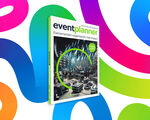What it takes to be an event professional changes at the speed of light these days, with more and more things constantly being added onto our plates.
The increasing demands can overwhelm even the most polished planner: You should learn new skills. You need to consider these new insights. You should apply these new practices…
Every single day, planning events means navigating new challenges and things to understand, learn, or adapt. Apart from planning and promoting the event, now professionals must showcase a new range of abilities and roles.
Don’t panic: No matter how overwhelming all this sounds, the good news is that we, as planners, have become more than logistic executors.
Maybe our main goal used to be to carry out repetitive and redundant planning tasks, but times have changed, and now we’re encouraged to become more creative and meaningful in our work. With the gradual automatization of logistics, we’ve made more space (and time!) for increasing our value.
We are not just event planners anymore; we are experience designers. We’re not just picking out a caterer and a venue; we are actually creating the experience our attendees will have during the event. And this means we wear many different hats these days.
Here are some of them:
Role #1. Architects of meaningful connections between attendees
One of the greatest mistakes planners make is believing that networking organically happens on its own. Just invite a bunch of people, engage them in a few ice breaking games or invite them to have a drink and chat at a cocktail dinner, and they’ll instantly bond.
That’s so wrong.
Although people do attend events to connect with others, the networking part is still painful and considered to be a mined territory, even by extroverts.
Apart from that, the way we connect to each other is changing. We text more than we talk, and so we feel more secure under the protection of an app. That’s why one of the main (new) roles event professionals have is to actually design and enable meaningful connections between the attendees.
Role #2. Content creators
Although you might not like it, being an event professional nowadays also means being a promoter or marketer. That’s why it’s crucial to understand the power of content creation and marketing. Planning an event (or multiple events) is only half of the job.
The other half is trying to figure out how to promote your event. A good idea is to build a fan base or an audience by creating useful content that supports the main idea behind your event. This content must be created both before the event (interviews with speakers, articles, white papers, etc.) and after the event (videos, photos, blog posts with valuable insights, etc.).
Role #3. Designers of transformative experience
The thing attendees are seeking the most at events is the access to transformative and even life-changing experiences. That’s why you can’t really call yourself “just a planner” anymore.
You are so much more than that.
You are a designer of experiences that must transform your audience’s beliefs, thoughts, and actions. What does this mean? Instead of seeing event dynamics as mere activities to fill up the day, it means you design everything with a purpose.
Will this new format get attendees excited about the topic? Will the event or certain dynamics engage the guests in meaningful interactions? Will the audience remember what they learned and experienced during your event? You can’t start planning something without getting the answers to these questions.
Role #4. Co-creation enablers
Events are perfect environments for co-creation. By seeing the attendees as active participants in building their own experiences and deciding how to make the most out of the event, you’ll become a co-creation advocate and plan dynamics that are truly connecting the attendees.
Role #5. Data analysts
You can’t take the next step without knowing how to read data about the event and your attendees. Your further steps and the validation of your event strategy depend on your ability to read the ROI and the event KPIs.
That’s why, apart from being an architect of meaningful interactions, a designer of transformative experiences, a content creator, and a co-creation enabler, you also need to become a data analyst.
How many attendees downloaded the app? How many of them were active on social media? How many were actually involved in the event dynamic? These stats are only the tip of the iceberg. Once you decide to take full control over the data, you’ll gain a totally new understanding about your event and the practices you should or shouldn’t apply.
Wrap-up
Today’s event professional is so much more than just a planner. The growing competition and changes in attendees’ expectations means you now need a broader vision of how your events work.
However, thanks to the new event technology through which you can automatize much of the event logistics, you can take your time and actually become a visionary and a powerful strategist that knows how to increase the quality of your events and get your attendees to enjoy and remember their experiences.







